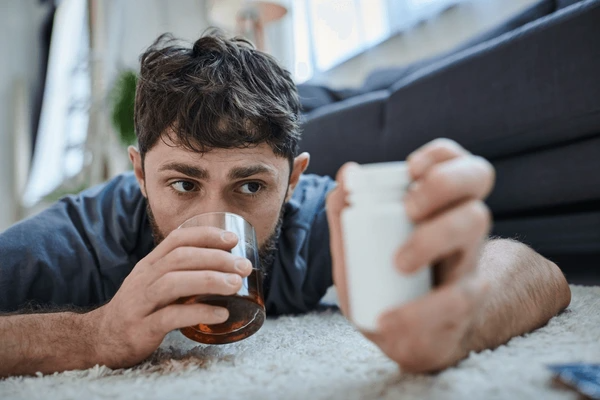Alcohol and Seroquel Interactions
When alcohol and Seroquel (quetiapine) are combined, they can interact in ways that are potentially harmful to the body. Both substances have sedative effects on the central nervous system, which can lead to increased drowsiness, dizziness, and impaired coordination when used together. It is important to understand the potential risks and increased side effects associated with this combination.
Sedative Effects of Both Substances
Alcohol and Seroquel are both known to have sedative effects. Alcohol is a central nervous system depressant that can induce relaxation and drowsiness. Seroquel, on the other hand, is an antipsychotic medication that is prescribed to treat various mental health conditions. It works by affecting certain neurotransmitters in the brain, helping to regulate mood, thoughts, and behavior.
When alcohol and Seroquel are used together, their sedative effects can be intensified. This can result in excessive drowsiness, making it difficult to stay alert and focused. Dizziness and impaired coordination may also be experienced, increasing the risk of accidents and falls. It is important to be cautious and avoid activities that require mental alertness or physical coordination when consuming alcohol while taking Seroquel.
Increased Risk of Side Effects
Combining alcohol and Seroquel can lead to potential interactions and increased side effects due to their sedative effects on the central nervous system. This combination may result in excessive drowsiness, confusion, impaired judgment, and difficulty concentrating. It can also increase the risk of experiencing orthostatic hypotension, which is a sudden drop in blood pressure upon standing up. Orthostatic hypotension can cause dizziness and fainting, posing a risk for injury.
Furthermore, alcohol is a depressant that can worsen symptoms of depression, anxiety, and other mental health conditions. It can interfere with the effectiveness of Seroquel in treating these conditions. It is important to discuss with a healthcare professional any concerns or questions about the potential interactions between alcohol and Seroquel if you are prescribed this medication for mental health purposes [1].
Understanding the potential risks and interactions between alcohol and Seroquel is essential for your safety and well-being. If you have been prescribed Seroquel, it is advisable to limit or avoid alcohol consumption. It is always best to consult with your healthcare provider regarding the use of alcohol while taking any medication, including Seroquel. They can provide guidance specific to your individual circumstances and help you make informed decisions about your treatment plan.
Effects on Central Nervous System
When alcohol and Seroquel (quetiapine) are combined, they can have significant effects on the central nervous system. Both substances have sedative properties, and their interaction can lead to various impairments, including drowsiness, dizziness, and impaired coordination.
Drowsiness and Dizziness
Combining alcohol and Seroquel can result in increased drowsiness. Alcohol is a depressant that can intensify the sedative effects of Seroquel, leading to excessive sleepiness and difficulty staying awake. This combination can make it challenging to perform daily activities and may increase the risk of accidents and injuries.
Dizziness is another common effect of the interaction between alcohol and Seroquel. Both substances can cause a drop in blood pressure, leading to feelings of lightheadedness and unsteadiness. This can make it difficult to maintain proper balance and coordination.
Impaired Coordination
Alcohol and Seroquel can impair coordination, making it challenging to perform tasks that require precise movements. The sedative effects of both substances can lead to decreased motor skills and delayed reaction times. This can increase the risk of accidents, falls, and other injuries, especially when engaging in activities such as driving or operating machinery.
It is important to note that the interaction between alcohol and Seroquel can vary depending on individual factors, such as dosage, tolerance, and overall health. It is always best to consult with a healthcare professional or pharmacist to understand the specific risks associated with combining alcohol and Seroquel.
For individuals taking Seroquel, it is generally recommended to avoid or limit alcohol consumption to reduce the potential for adverse effects. If you have concerns about alcohol use or need guidance on how to safely wean yourself off alcohol, please consult our article on how to wean yourself off alcohol safely.
Understanding the effects of alcohol and Seroquel on the central nervous system is essential for individuals taking this medication. By being aware of the potential risks and taking appropriate precautions, individuals can ensure their safety and well-being while managing their mental health conditions.
Risks of Combining Alcohol and Seroquel
Combining alcohol and Seroquel (quetiapine) can have serious implications for one’s health. The interaction between these substances can lead to various risks and adverse effects that should be taken into consideration.
Orthostatic Hypotension
One significant risk of combining alcohol and Seroquel is the potential for orthostatic hypotension. This condition refers to a sudden drop in blood pressure upon standing up, which can cause dizziness and fainting. Alcohol and Seroquel both have sedative effects on the central nervous system, and their combined use can increase the likelihood of experiencing this drop in blood pressure. To learn more about how alcohol affects blood pressure, you can read our article on how does alcohol affect blood pressure?.
Exacerbation of Mental Health Conditions
Combining alcohol and Seroquel can also worsen existing mental health conditions or lead to the development of new symptoms. The interaction between these substances can increase sedation, impair judgment, and cause difficulty concentrating. This elevation of side effects can elevate the risk of accidents, falls, and other dangerous situations. It may also exacerbate mental health symptoms such as mood swings and anxiety. If you’re interested in learning more about the relationship between alcohol and mental health, we have an article on alcoholism and vertigo that you may find informative.
It’s crucial to be aware of these risks when considering the combination of alcohol and Seroquel. If you are taking Seroquel as part of your medication regimen, it is recommended to avoid alcohol consumption altogether. However, if you choose to consume alcohol, it is essential to do so in moderation and only after consulting with your healthcare provider.
For those who may be struggling with alcohol use disorder and wish to seek help, it is essential to reach out to a healthcare professional or addiction specialist. They can provide guidance on how to safely wean yourself off alcohol and offer support throughout the recovery process.
Understanding the risks associated with combining alcohol and Seroquel is crucial for maintaining your overall well-being. By prioritizing your health and making informed decisions, you can minimize potential complications and ensure the effectiveness of your medication. For more information about the effects of alcohol and the importance of responsible consumption, consider reading our article on risks of excessive alcohol consumption and gaining a better understanding of the effects of alcohol.
Get your question answered now.
Impact on Medication Effectiveness
When it comes to combining alcohol and Seroquel (quetiapine), it’s essential to consider the potential impact on the effectiveness of the medication. Alcohol can interfere with the metabolism of Seroquel in the liver, potentially leading to higher levels of the medication in the bloodstream. This interference can amplify the sedative effects of Seroquel and increase the risk of experiencing side effects.
Interference with Seroquel’s Efficacy
Both Seroquel and alcohol cause changes in the brain when consumed, affecting the chemical dopamine in opposite ways. Alcohol could potentially make Seroquel less effective as they have contrasting effects on dopamine in the brain [3]. It’s important to note that the specific interaction between alcohol and Seroquel may vary depending on individual factors, such as dosage and frequency of alcohol consumption.
Metabolism of Seroquel in the Body
Alcohol can impact the metabolism of Seroquel in the liver, which may affect the breakdown and elimination of the medication from the body. This can result in higher levels of Seroquel circulating in the bloodstream, potentially intensifying its sedative effects and increasing the risk of side effects. It’s crucial to be aware of this interaction and discuss it with a healthcare professional to ensure the safe and effective use of Seroquel while consuming alcohol.
Understanding the potential interference with Seroquel’s efficacy and the impact on its metabolism in the body highlights the importance of avoiding alcohol while taking this medication. It’s essential to follow the guidance of a healthcare provider and communicate any concerns or questions regarding alcohol consumption and medication use. If you or someone you know struggles with alcohol use, consider seeking professional help to address the issue. For more information on how to wean yourself off alcohol safely, please visit our article on how to wean yourself off alcohol safely.
Recommendations and Guidelines
When it comes to the interaction between alcohol and Seroquel (quetiapine), it is important to exercise caution and follow certain recommendations and guidelines to ensure your safety and well-being. Combining alcohol with Seroquel can have adverse effects on your body and increase the risk of side effects.
Limiting Alcohol Intake
It is strongly recommended to limit alcohol intake while taking Seroquel. Guidelines suggest that no more than one or two drinks at a time should be consumed. It is important to note that everyone responds differently to alcohol, and factors such as genetics, age, and medical history can influence the effects of alcohol on individuals. To prevent potential interactions and minimize risks, it is best to err on the side of caution and limit alcohol consumption.
Avoiding Binge Drinking
Binge drinking, which involves consuming large amounts of alcohol in a short period, should be strictly avoided while taking Seroquel. Binge drinking can significantly enhance the sedative effects of the medication, leading to increased drowsiness, impaired coordination, difficulty thinking clearly, and an elevated risk of seizures and other serious side effects. It is essential to be mindful of your alcohol consumption and avoid excessive or rapid intake.
It is worth noting that abruptly stopping medications like Seroquel in order to drink alcohol can cause withdrawal symptoms. Therefore, it is advised not to discontinue atypical antipsychotics abruptly for the purpose of consuming alcohol. If you have concerns about alcohol use or are looking for resources on how to safely reduce alcohol consumption, consider seeking guidance on how to wean yourself off alcohol safely.
By adhering to these recommendations and guidelines, individuals taking Seroquel can minimize the potential risks associated with combining alcohol and the medication. It is crucial to prioritize your health and make informed decisions regarding alcohol consumption. Understanding the effects of alcohol on the body and the potential interactions with Seroquel can help you make responsible choices and safeguard your well-being.
Health Consequences and Awareness
When it comes to alcohol consumption, especially when combined with medications like Seroquel, it is crucial to understand the potential risks and health consequences associated with excessive alcohol intake. Being aware of the effects of alcohol on the body and its interactions with Seroquel can help individuals make informed decisions regarding alcohol consumption.
Risks of Excessive Alcohol Consumption
Excessive alcohol consumption can have serious health consequences and pose risks to physical and mental well-being. Some of the risks associated with excessive alcohol intake include:
- Liver damage: Prolonged and heavy alcohol use can lead to liver disease, such as alcoholic hepatitis, cirrhosis, and liver cancer.
- Cardiovascular problems: Alcohol can affect blood pressure and contribute to conditions like hypertension and an increased risk of heart disease.
- Weakened immune system: Excessive alcohol consumption can weaken the immune system, making individuals more susceptible to infections and diseases.
- Mental health issues: Alcohol can impact mental health by changing neurotransmitter levels in the brain, leading to or worsening symptoms like mood swings, irritability, anxiety, and depression.
To learn more about the effects of alcohol on the body, including its impact on blood pressure and hot flashes, visit our articles on how does alcohol affect blood pressure? and does alcohol cause hot flashes?.
Understanding Effects of Alcohol
Alcohol is a central nervous system depressant, meaning it slows down brain activity and affects coordination and judgment. When combined with medications like Seroquel, which also has sedative effects, the effects can be intensified. It is important to be aware of the potential interactions and risks associated with combining alcohol and Seroquel.
Alcohol can impair the medication’s ability to effectively treat symptoms of mental health conditions like extreme sadness, mood swings, anxiety, irritability, and hallucinations. If alcohol is consumed while on Seroquel, these symptoms may reoccur and resurface more intensely. It is important to follow the prescribed treatment plan and refrain from excessive alcohol consumption to ensure optimal effectiveness of the medication [4].
By understanding the risks of excessive alcohol consumption and the effects of alcohol on the body, individuals can make informed decisions about their alcohol intake while taking medications like Seroquel. It is important to speak with a healthcare professional for personalized guidance and to ensure the safe and effective management of mental health conditions. If you or someone you know is struggling with alcoholism, seeking professional help and considering how to wean yourself off alcohol safely can be crucial steps towards recovery and overall well-being.
Resources
- [1]: https://www.coniferpark.com/blog/alcohol-and-seroquel-quetiapine
- [2]: https://www.northstarbehavioralhealthmn.com/resources/alcohol-seroquel-quetiapine
- [3]: https://www.goodrx.com/quetiapine/alcohol-with-seroquel-abilify-antipsychotics
- [4]: https://www.banyantreatmentcenter.com/side-effects-of-seroquel-and-alcohol/
Did You Know? According to WHO, one out of every seven teens is struggling with some sort of mental illness.










